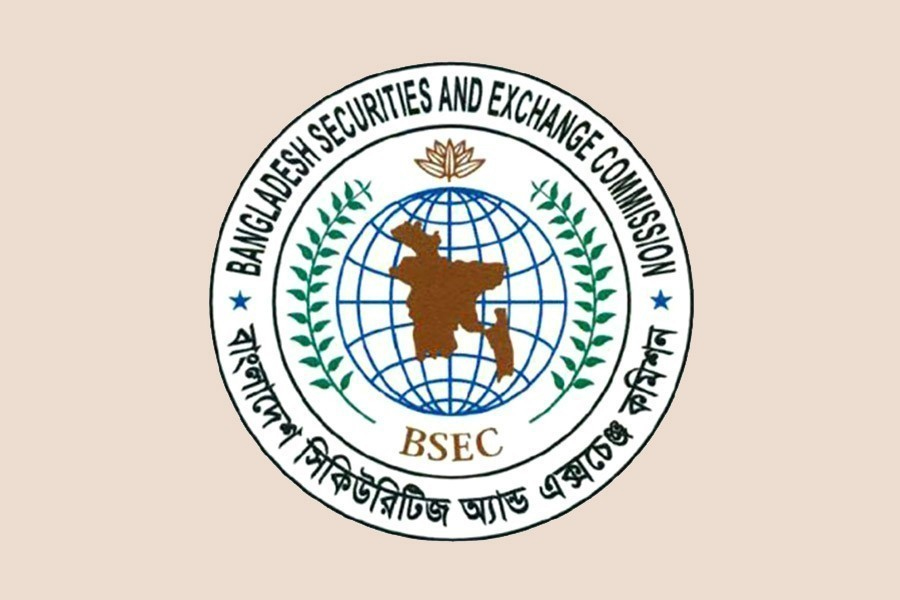
Published :
Updated :

The securities regulator has assured stockbrokers of considering their proposal with 'importance' regarding extension of the timeframe for provisioning against negative equity and unrealized losses.
The assurance came on Tuesday as representatives from top 20 brokers met the top brass of the Bangladesh Securities and Exchange Commission (BSEC) at its office against the backdrop of the week-long fall of the stock market.
The prime index of the Dhaka Stock Exchange (DSE) fell 179 points or 3.44 per cent to 5,026 on Tuesday, lowest in six months.
The market cap of the prime bourse, calculated by multiplying the total number of outstanding shares with the market prices of stocks, shed Tk 42 billion in the past seven days.
Facing the continuous erosion of stock prices, the market watchdog held a meeting with top brokers to find out the reasons behind the persistent market plunge.
The brokers highlighted various problems surrounding the market, including negative equity that has been hindering the market's growth for more than a decade.
The outstanding negative equity against margin loans taken for investments in the equity market amounted to Tk 78.24 billion by October last year.
The intermediaries during the meeting demanded a time extension for provisioning against negative equity.
The latest deadline for keeping provisions against negative equity in margin accounts expired in December last year while the deadline for provisioning against unrealized losses in dealer accounts ended in February this year.
At the meeting, stockbrokers said the magnitude of the problem of negative equity varied from broker to broker. So, it would be helpful if stockbrokers are offered separate timeframes for provisioning.
BSEC spokesperson Md. Abul Kalam confirmed to the FE that the issue of negative equity was discussed at the meeting.
"The commission said it would try to consider the proposal of the stockbrokers with importance as the regulator wants to support the market solving the problem of negative equity," Mr. Kalam said.
The stockbrokers at the meeting were asked to submit their proposals separately, he added.
At the meeting, the commission said the deadlines for provisioning had been extended repeatedly over the years but to no avail.
Chief Executive Officer of IDLC Securities Md. Saifuddin said brokers would have different financial capacity, board structure, capital base, negative equity and losses in dealer accounts.
So, the commission is not optimistic about any positive result from a further extension of the timeframe through a uniform directive.
In this situation, the securities regulator has requested the stockbrokers to convey how long they may take to resolve the problem of provisioning against negative equity and unrealized losses, said Mr Saifuddin.
If stockbrokers are given the scope of deciding its own time frame for provisioning, they may never resolve negative equity.
Asked whether separate timeframes for provisioning would bring about any positive outcome, Mr Saifuddin said, "A stockbroker must feel an urgency to complete provisioning within its committed time frame. Otherwise, the broker will face the music."
The problem of negative equity, which has been persisting since the 2010 market debacle, gradually intensified over the past 15 years and turned into a heavy burden on the equity market.
The brokers said margin loans had deepened financial distress and weakened intermediaries in the stock market and banks. There were spill-over impacts onto the whole market affecting even those who have not taken any margin loan.
On the continuous fall of the index, market experts said concerns over the potential impact of abrupt gas price hikes alongside possible corporate tax rate hikes by the National Board of Revenue, discussed in pre-budget sessions, had negatively affected investor sentiment.
The government increased gas prices by 33 per cent on average last week. On the other hand, the yield rate of risk-free Treasury bonds rose significantly recently.
Meanwhile, the BSEC on Tuesday said the restriction that no investor should inject more than 5 per cent of their investments in any "A" stock will not be applied to the Investment Corporation of Bangladesh (ICB)
The exemption was granted in response to a request, intended to boost market liquidity and increase investment capability in fundamentally-sound stocks, said the BSEC.
mufazzal.fe@gmail.com


 For all latest news, follow The Financial Express Google News channel.
For all latest news, follow The Financial Express Google News channel.